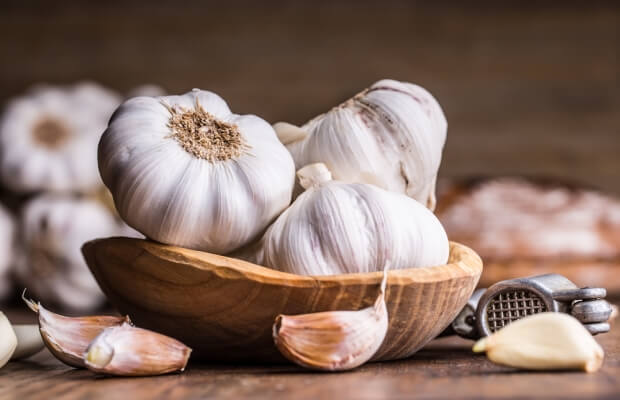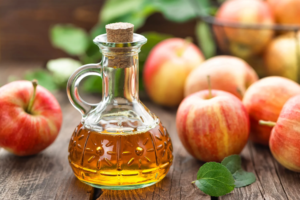
Garlic has been used, both medicinally and as a food or flavoring, since the dawn of recorded history. Ancient medical texts from as far afield as Egypt, China, India, Greece, and Rome discussed the medical uses of garlic. The Bible and Qur’an mention it, and while the plant is native to Central Asia, cloves dating back more than 3000 years were found in King Tut’s tomb.
Garlic is part of the Allium genus, which also includes onions, shallots, leeks, and chives. Some of the other members of this genus share certain health properties with garlic {Encyclopedia Britannica: “Allium.”} Its potential benefits include:
- Cardiac Health
- Antimicrobial
- Anticancer
Nutrition Information
Nutrients per Serving
In food, garlic is used in small quantities and contains very few calories, fat, protein, or carbohydrates. Its health action comes from the enzymes and unique compounds that it contains. One clove of garlic contains:
- Calories: 4
- Protein: 0 grams
- Fat: 0 grams
- Carbohydrates: 1gram
- Fiber: 0 gram
Potential Health Benefits of Garlic
Medical research links garlic to a number of health benefits. However, some studies have suggested that raw garlic may be more effective than the cooked version, while garlic supplements are the most effective. Garlic tea retains the health benefits of raw garlic, as long as it is prepared properly: the key is boiling your crushed garlic no longer than 3 minutes.
Cardiac Health
Researchers at Emory University School of Medicine found that a component of garlic oil, diallyl trisulfide, helps protect the heart after a heart attack and during heart surgery. Mice that received this component after a heart attack had 61% less damage to the affected cardiac tissue than untreated mice.
The research also suggested that the component could reduce heart enlargement in a mouse model of heart failure. Further research is needed to understand the effects on humans.
Garlic supplements, and in particular aged garlic extract, have also been shown to reduce blood pressure in people with hypertension. It appears to do so in part by preventing vasoconstriction, or narrowing of blood vessels. While garlic’s effects are comparable to standard blood-pressure drugs, it has been found that people who have inadequate levels of vitamin B may not experience this benefit.
Garlic oil has also been found to be protective against cardiomyopathy, a type of chronic heart disease that is the leading cause of death among diabetes patients. When diabetic mice were fed garlic oil, they developed more changes associated with cardiac protection than diabetic mice in the control group. Further research is needed to understand the effects on humans.
Reduced Risk of Infections
Garlic is widely recognized for its ability to fight bacteria, viruses, fungi, and even parasites. One study found that allicin, an active component of freshly crushed garlic, had antiviral properties and was also effective against a broad range of bacteria, including multidrug-resistant strains of E. coli.
It also found that allicin had antifungal properties, including against Candida albicans, which causes yeast infections. Its antiparasitic action helps fight major intestinal parasites, including Giardia. Other studies have also shown that allicin can help inhibit the growth of the bacteria methicillin-resistant Staphylococcus aureus (MRSA).
Reduced Blood Clotting
Many studies have found that garlic can reduce the chances that blood clots will form. This can also be a risk for some people. One randomized double-blind trial indicated that aged garlic extract, unlike fresh garlic or other garlic supplements, does not increase the risk of bleeding in patients taking warfarin.
Reduced Risk of Cancer
Some studies have associated garlic — and other members of the Allium family — with a reduced risk of certain cancers. The Iowa Women’s Health Study, which included more than 40,000 women aged between 55 and 69, found that garlic consumption may decrease the risk of developing colon cancer.
A 30-year study of 125,000 people found that garlic consumption was associated with a reduction in gastric cancer risk. In that study, participants who consumed garlic 5 or more times a week had the greatest reduction, while those who consumed it less than once a week had the highest risk of gastric cancer.
Similarly, a Chinese study of several hundred lung cancer patients found that regular consumption of raw garlic was associated with a lower risk of lung cancer.
Potential Risks of Garlic
The primary side effect of garlic consumption is its blood-thinning properties. If you don’t usually eat garlic, you may want to check with your doctor before adding it to your diet.
Excess Bleeding
Because garlic can make blood less likely to clot, you should stop eating it 7 to 10 days before any surgery you have planned.
Drug Interactions
Avoid garlic if you’re already taking an anticoagulant, such as Coumadin (warfarin) or Heparin, because the blood-thinning action of the medication may be increased.
Source: Click Here


